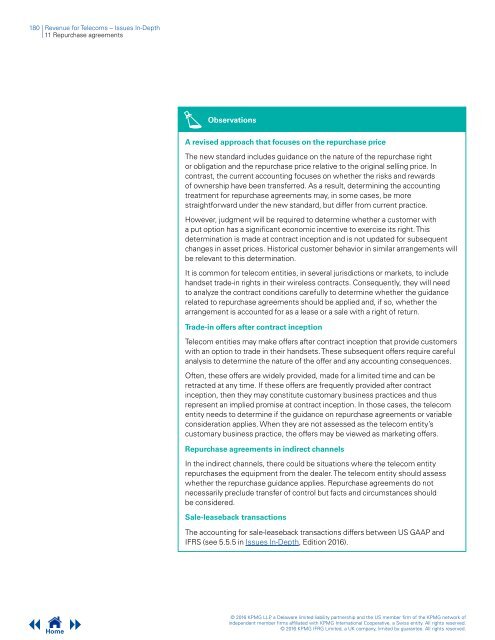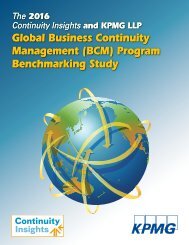Revenue for Telecoms
2cdncba
2cdncba
Create successful ePaper yourself
Turn your PDF publications into a flip-book with our unique Google optimized e-Paper software.
180 | <strong>Revenue</strong> <strong>for</strong> <strong>Telecoms</strong> – Issues In-Depth<br />
| 11 Repurchase agreements<br />
Observations<br />
A revised approach that focuses on the repurchase price<br />
The new standard includes guidance on the nature of the repurchase right<br />
or obligation and the repurchase price relative to the original selling price. In<br />
contrast, the current accounting focuses on whether the risks and rewards<br />
of ownership have been transferred. As a result, determining the accounting<br />
treatment <strong>for</strong> repurchase agreements may, in some cases, be more<br />
straight<strong>for</strong>ward under the new standard, but differ from current practice.<br />
However, judgment will be required to determine whether a customer with<br />
a put option has a significant economic incentive to exercise its right. This<br />
determination is made at contract inception and is not updated <strong>for</strong> subsequent<br />
changes in asset prices. Historical customer behavior in similar arrangements will<br />
be relevant to this determination.<br />
It is common <strong>for</strong> telecom entities, in several jurisdictions or markets, to include<br />
handset trade-in rights in their wireless contracts. Consequently, they will need<br />
to analyze the contract conditions carefully to determine whether the guidance<br />
related to repurchase agreements should be applied and, if so, whether the<br />
arrangement is accounted <strong>for</strong> as a lease or a sale with a right of return.<br />
Trade-in offers after contract inception<br />
Telecom entities may make offers after contract inception that provide customers<br />
with an option to trade in their handsets. These subsequent offers require careful<br />
analysis to determine the nature of the offer and any accounting consequences.<br />
Often, these offers are widely provided, made <strong>for</strong> a limited time and can be<br />
retracted at any time. If these offers are frequently provided after contract<br />
inception, then they may constitute customary business practices and thus<br />
represent an implied promise at contract inception. In those cases, the telecom<br />
entity needs to determine if the guidance on repurchase agreements or variable<br />
consideration applies. When they are not assessed as the telecom entity’s<br />
customary business practice, the offers may be viewed as marketing offers.<br />
Repurchase agreements in indirect channels<br />
In the indirect channels, there could be situations where the telecom entity<br />
repurchases the equipment from the dealer. The telecom entity should assess<br />
whether the repurchase guidance applies. Repurchase agreements do not<br />
necessarily preclude transfer of control but facts and circumstances should<br />
be considered.<br />
Sale-leaseback transactions<br />
The accounting <strong>for</strong> sale-leaseback transactions differs between US GAAP and<br />
IFRS (see 5.5.5 in Issues In-Depth, Edition 2016).<br />
Home<br />
© 2016 KPMG LLP, a Delaware limited liability partnership and the US member firm of the KPMG network of<br />
independent member firms affiliated with KPMG International Cooperative, a Swiss entity. All rights reserved.<br />
© 2016 KPMG IFRG Limited, a UK company, limited by guarantee. All rights reserved.







